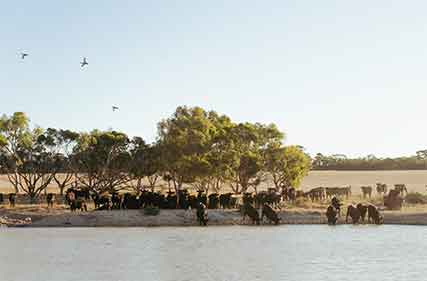 Cattle Australia has modernised its emissions focus to concentrate on the bottom-line warming impact of the industry and calling on a review of MLA’s CN30 (Carbon Neutral) framework.
Cattle Australia has modernised its emissions focus to concentrate on the bottom-line warming impact of the industry and calling on a review of MLA’s CN30 (Carbon Neutral) framework.
Cattle Australia board has endorsed a new climate neutral target that industry should achieve earlier than 2030.
Climate neutrality is the point where the industry would no longer have a negative impact on the planet’s temperature.
Cattle Australia Chair, David Foote said it made sense to focus on eliminating industry’s warming impact rather than a simplified CO2 equivalent.
“International efforts are focussed on limiting warming – we should be doing the same, Mr Foote said.
“Cattle Australia’s adoption of a climate neutral approach is based on IPCC science and is well aligned with the climate stabilisation goal of the Paris Agreement.
“We need to update how the industry accounts for and approaches our serious commitment to reducing emissions.
“Now is an appropriate point to review CN30 and re-evaluate whether it is the right goal for the Australian beef industry based on the most current scientific research.
“We are constantly learning about our how our emissions interact in the atmosphere, and we should not wed ourselves to how we understood the issue a decade ago.
“Cattle Australia members are seeking recognition that their emissions are part of a natural cycle, which is vastly different to fossil fuel emissions.
“Methane has a short lifespan and breaks down into CO2 which the beef industry has the ability to capture through pasture photosynthesis.
“This new focus will better guide producer investment in climate positive production systems.
“The recent CSIRO report Pathways to Climate Neutrality for the Australian Red Meat Industry undertook research and modelling of the red meat industry’s warming impact.
“The generally extensive nature of Australian livestock production means we are very well positioned on a global scale to operate in a climate friendly manner.
“It is crucial we can demonstrate to our consumers, that our product will be climate neutral, and beyond that can contribute to net cooling.
“The Australian grassfed beef sector remains fully committed to reducing and mitigating emissions.
“We want to ensure that our targets are achievable, and we are accounting correctly for our impact on climate.”
-Cattle Australia
